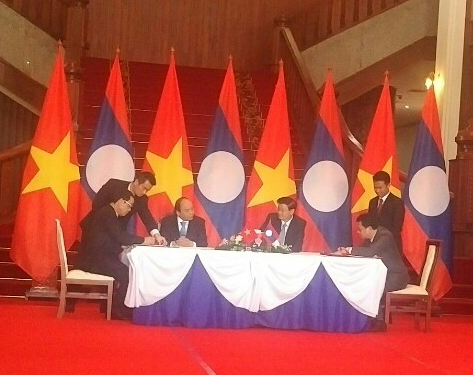
(HBO) – Hoa Binh province and Houaphanh province of Laos on February 5 signed a Memorandum of Understanding to implement a joint project to build the Huameuang District High School in Houaphanh.
The MoU was signed in Laos by Chairman of the Hoa Binh People’s
Committee Nguyen Van Quang and Governor of Houaphanh Van Xay Pheng Xum Ma in
the presence of Prime Minister Nguyen Xuan Phuc and his Lao counterpart
Thongloun Sisoulith.

Chairman of the Hoa Binh People’s
Committee Nguyen Van Quang and Governor of Houaphanh Van Xay Pheng Xum Ma
signed a Memorandum of Understanding to build the Huameuang District High School
in Houaphanh.
The project is implemented on the basis of the agreement between
the Governments of Vietnam and Laos on regulations on finance and management of
projects funded by Vietnam’s non-refundable aid.
Under the MoU, the school will have two 2-storey buildings with
eight classrooms each, with total floor area of 1,350 sq.m. Each classroom will
be able to accommodate about 30-35 students. By 2020, the school will be able
to accommodate 1,000 students at middle and high school-level education.
The school will also include a multi-purpose building, an administrative
building, a library, a dormitory and other facilities serving teaching and
learning activities.
The Lao side is responsible for allocating land for the project
and paying compensation for land clearance; ensuring security at the project
area; and providing information needed for the project.
Meanwhile, the Vietnamese side will select contractors that
provide consultancy, construction and purchasing services in accordance with
laws. It is tasked to direct the consultancy service provider to produce a
design for the school and arrange capital disbursement.
The Departments of Planning and Investment of Hoa Binh and
Houaphanh will work as project coordinators on the behalf of the two provinces’
administrations while the Management Board of ODA Projects of Hoa Binh will be
in charge of carrying out specific tasks of the project.
Hoa Binh province is undergoing a dynamic transformation amid Vietnam’s national digital transition. Building on Poliburo’s Resolution No. 57-NQ/TW on breakthroughs in science, technology, innovation, and national digital transformation, the province has rolled out a wide range of practical action plans. A standout initiative is the "Digital Literacy for All” movement, an effort to ensure that no one is left behind in the digital era.
Hoa Binh province is undergoing a dynamic transformation in the wake of the national digital transformation movement. Building on Resolution No. 57-NQ/TW of the Politburo on breakthroughs in science, technology, innovation, and national digital transformation, the province has implemented a wide range of practical action plans. A standout initiative is the "Digital Literacy for All” movement ambitious effort to ensure that no one is left behind in the digital age.
With a spirit of unity and proactive problem-solving, the Party Committee, the government and the people of Dong Lai Commune (Tan Lac District) have made great strides in implementing the resolutions of the 24th Party Congress of the commune for the 2020 - 2025 term. Focusing on leadership and practical actions, the commune has brought the Party’s resolutions into daily life, creating strong impacts and pushing the local development forward.
Amid the nationwide push for digital transformation, young people in Hoa Binh Province are stepping up as dynamic pioneers, applying technology to enhance Youth Union operations and expand the reach of youth-led initiatives. Through creativity and adaptability, Youth Union organizations at all levels have introduced a series of practical solutions, contributing to modern governance and community development.
In recent years, An Nghia commune, located in Lac Son district, has stepped up administrative reform, focusing on improving the quality and efficiency of its single-window service unit for receiving and processing administrative procedures. These improvements have helped create favourable conditions for local residents and organisations to handle administrative procedures, contributing to the commune’s broader socio-economic development.
The Prime Minister-approved master plan to develop the multi-use value of forests ecosystems through 2030, with a vision to 2050, aims to improve the management and sustainable use of forest resources, create jobs, increase incomes, and improve the living standards of ethnic minorities, people in mountainous and remote areas, forest workers and those living near forests.



